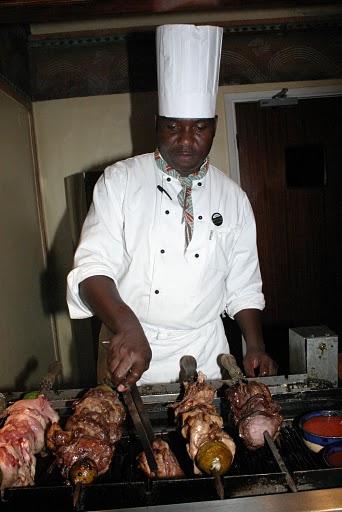For the readers that don’t know, Andrew Mutua is one of the founders of www.pamojashops.com.
PamojaShops is a community of buyers and sellers of African handmade wares. We hope through this platform which is not limited to time and/or place, we will open up our creativity and art to the world. PamojaShops is the online version of open air markets, commonly known as Maasai markets that showcase our creativity, our culture, our enterprising spirit, our art, and our unique identity with various influences both from within and outside.
Today, Andrew opens up to Like Chapaa.
Q. You’re quite an achiever, tell us about you.
I’m a 29 year old tech enthusiast, who loves Jazz (check out my blog). I have been in the IT industry now for 8 years and I recently co-founded PamojaShops.
Q. How do you make money online?
I believe you’re asking about our business model. Initially, we had thought of having a rental model, whereby each vendor pays a fee to open and maintain an online stall. Pretty much what happens in the physical world.
However, this has since changed to commissioned-based model where each product sold will be charged a small percentage over and above its price. (The most unique part is that the vendors acquire their own micro-site and they can use that to market themselves i.e www.vendor.pamojashops.com)
Q. How did you start?
The idea had been brewing for a while now. I think it has been a year since I first thought of having the online version of Maasai Market (African Handicrafts open air market).After some prodding from my sister I decided to plunge in and pursue the dream. She followed that up with a promise to be an investor and partner in the venture. With that major boost it was full speed ahead to making it happen.
Q. What challenges did you face and how did you overcome them?
Initially it was hard getting someone who could translate my idea into a digital platform (site) which could set up and host online shops (E-stalls) and facilitate payment and shipments. But lucky enough I did finally get someone (Nickel Pro) who understand and even further refined my idea – I guess through persistence it finally panned out.
The other challenge is the target user, (Maasai Market Merchants) is mostly not computer literate. And considering we had hoped to have a system fully automated and within the control of the user we’ve had to step back and evaluate the viability of this approach. What we’re now doing is working hand-in-hand with the merchants taking them through the entire process. So it’s gonna be pretty involving and hands-on at the start…again this is good, it may help in understanding the trade more intimately and to craft a more relevant solution.
Q. What are the challenges of being an entrepreneur in Kenya?
Funding is an issue but I believe this slowly changing. I think there’s a lack of support structures to help any start-up out there e.g. have a forum for startups, advisors, incubation centers and low cost administrative support for start-up.
Again, there’s good news here the development of initiatives such i-Hub and Nailab seek to tackle some of these challenges.
Q. What was critical to your success?
We we are not there yet, but Passion in whatever you’re undertaking is very important because when all else fails it’s the only thing that keeps you afloat, energized and fired up to move on.
The other is a community of people; be they techies or any skilled person ready to rent their expertise; entrepreneurs who offer their advice and inspire you with their experiences. The community helps you where you can’t; gives you guidance and direction and, there are people out there ready and willing to help and I think the i-Hub has doing a great job in fostering this kind of community support and partnership.
Over and above all, the other attributes of hard work, teamwork and more belief in God has also been key in this venture. When you take the uncharted road and you don’t know what the next step holds, God gives you the strength and bravery to plunge in and keep going.
Q. What about the competition and marketing, do you need to advertise, print flyers participate to conferences or is it mostly word of mouth?
Marketing is a critical element to any business as a means of putting the word out, promoting, raising awareness, seeking participation, etc., to eventually result in conversions (sales).
Word of Mouth ranks up there as best means of Marketing. And in this regard we’re leveraging Social Media Tools – Facebook, Twitter, Blogs etc- to raise awareness; create a community of fans around our product and service.
In terms of Offline Marketing we’re looking to engage in intense evangelism of our product in every meet-up that we’re part of. And we’re also considering doing some flyer print-outs or some other print marketing materials.
Q. Do you think that in order to “make it big” online you have to live in a Western country? Or does Kenya offer more or less the same opportunities?
The Internet has since leveled the playing field quite dramatically. And although Western countries have certain advantages (support structures, availability of VCs, etc) I think now, in this day and age, we all have a chance to play in the same league as them. Look at platforms as Ushahidi that were birthed here and have since gone global. This is a testament that we have what it takes to develop world-class products.
Q. Where do you see yourself and your business (es) in the next 5 years?
I hope we’ll grow PamojaShops to be the world’s largest marketplace for all African Handicrafts.
I also see myself been involved heavily in various community service initiatives that I’m passionate about i.e. education and social entrepreneurship.
Q. If you had to do it all over again, what would you do differently?
No. I think the lessons, missteps, failures that I’ve made in life made me who I am and I wouldn’t trade that for anything. You can’t go back, we only move forward.
Q. What advice do you have for Internet business entrepreneurs in Kenya?
Act on that idea. Don’t get hung up on how unique that idea is and holding on to it like your life is depended on it. The best idea is the one that has been executed. Go ahead and make it happen or as Nike would say – Just Do it!
That’s all for today readers. If you like what you hear, why not go over to www.pamojashops.com and buy something or become a vendor?
Check out PamojaShops Facebook Page and Follow them on Twitter.
Or contact Andrew MUTUA- andy[at]pamojashops.com

